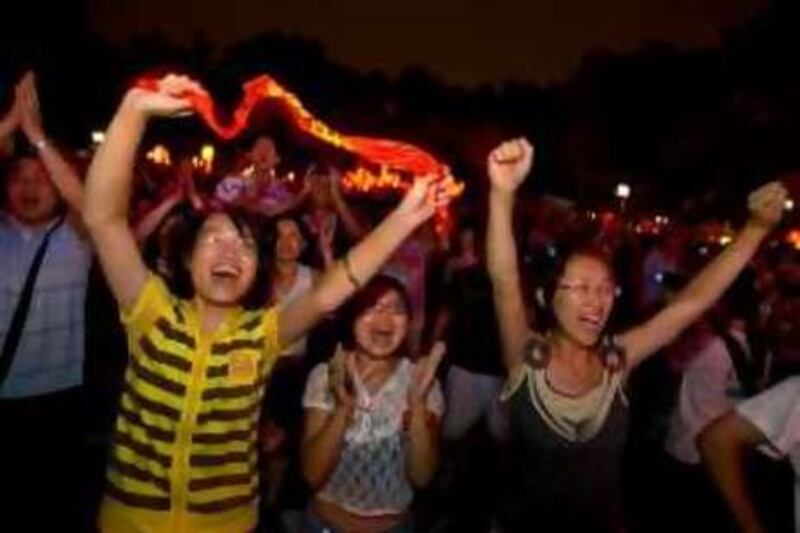BEIJING // Liu Siu Ping was just 14 in 2001 when China won the bid to host this year's Olympic Games. On the eve of the opening ceremony in Beijing last week, she, like hundreds of other Chinese, flocked to Tiananmen Square to revel in her country's moment in the sun.
Clutching a Chinese flag, and with a red scarf tied around her neck, she could barely contain her pride. "I love my country," she said. "I think the Olympics is the best way to show the world the real China and not the demon nation that you read about in foreign newspapers." George Orwell once described international sport - for its promotion of nationalism and rivalry - as "war minus the shooting". As the final countdown to the Games began, the Chinese have increasingly voiced their discontent at what they see as China-bashing by the West.
"The recent surge in nationalism is in response to what Chinese people believe have been escalating anti-China feelings in the run-up to the Olympics," said Lijia Zhang, a Beijing-based writer and analyst. "I have no problems with people criticising China. But at the same time the West is often too quick to present a biased and morally self-righteous view when it comes to reporting on China." Nationalist sentiment, particularly among China's educated youth, gained new momentum this spring after riots in Tibet and widespread criticism in the western media of Beijing's handling of the uprising.
"Many Chinese were genuinely baffled that sympathy for Tibetan independence seemed to increase in the West after bloody riots that killed innocent Chinese civilians," said Daniel Bell, a professor of political theory at Beijing's Tsinghua University. Protests in Europe during the Olympic torch relay triggered more public outrage, and thousands of Chinese gathered in front of the French supermarket chain Carrefour, holding national flags and demanding a boycott of all French goods.
Soon, T-shirts emblazoned with slogans, such as "I [Heart] China", "Listen to China's Voice", and "I Love T*b*t, but I Hate the Dalai Lama", became a popular way for people to voice their politics and national pride. While the more extreme reactions were largely confined to young people in web forums, the earthquake in China's Sichuan province in May brought the greater population together, as solemn remembrances quickly shifted to vigorous nationalist displays of solidarity, especially on the internet.
"These days students and intellectuals are more aware of views from outside of China because of the internet and also because many students are studying abroad, which was not the case in the 1980s," Prof Bell said. "The common belief is that there is a disproportionate view of China in many western news reports that often paint the country in the worst possible light. This makes them act very defensively."
The roots of China's strong sense of nationalism lie in the country's long and turbulent history. After suffering a century of "shame" at the hands of western and Japanese powers, the Chinese are finally beginning to have a different outlook on their country. From their perspective, three decades of rapid economic growth, political stability and greater personal freedoms mean it is time for China to play a more prominent role on the world stage.
"For so many years, China was described as the 'sick man of Asia'. Now we are powerful and rich enough to host a major international event," Ms Zhang, the Beijing analyst and writer, said. "The Olympics will be a success because the Chinese people want them to be and not just because the government wants to use it as a means of gaining legitimacy." Ms Zhang's views seem to echo those of the Chinese mainstream. Almost nine out of 10 Chinese are happy with the way things are progressing in their country - ranking China as the most satisfied out of the 24 countries surveyed by the Pew Research Center in April. An overwhelming 97 per cent of Chinese also believe that China's hosting of the Games will be a success, and nearly all of those polled think the Games will boost China's global profile.
Yet the success of this summer's Games will depend in part on whether they are, in fact, able to symbolise a new, self-confident and peace-loving China. Nobody is as aware of this as the Chinese Communist Party, which has spent more than US$56 billion (Dh204 bn) in a bid to demonstrate the Herculean strides the country has made since it opened its doors in the late 1980s. Stringent measures have been introduced to ensure that China's best face is on show at all times.
Chinese athletes have been asked to show humility when they win gold medals. Medal presenters have been given lessons in etiquette and instructions on how to dress during award ceremonies. And Chinese spectators have been told not to cheer too "aggressively" and to show appreciation for athletes from other countries, including historical arch-rivals, like Japan. Friday's opening ceremony featured a quote from Confucius, that "one of life's greatest pleasures is to welcome friends from afar".
"If that works as planned and assuming that the Games proceed without any major terrorist attacks, it [the Olympics] should be a success in terms of improving China's global image," Prof Bell said. "At least that is what we hope." * The National





